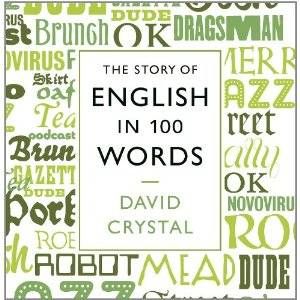But, what about trying to capture the entire development of the English language—now peaking at some two billion speakers worldwide and a lexicon of more than a million words (including dialects and technical terms)? And what about doing so with a list of, say, fewer words than it’s taken to compose this post so far… Crystal, who has written or edited nearly half a hundred books on the English language, took to the pages of The Telegraph this week to explain his process: It’s worthwhile reading the whole article, if not the book itself (despite exchange rates, it’s still worth the extra sterling). When I embarked on this project, some words gave me no choice. They just had to be in – such as the earliest example of a written word in the language. Thanks to an exciting archaeological find, we know this to be roe. That starts the story. And the latest word to arrive? Well, as new words come into the language every day, all I could do here is choose an example which points to the future. I picked Twittersphere. That left 98 more to find. We need principles on which to base a selection. The obvious one is chronological. The history of English is traditionally divided into periods: Old English, from the arrival of the Anglo-Saxons in AD 449 until the 11th century; Middle English from then until the 15th century; Early Modern English from then until the 18th century; and Modern English thereafter. It’s important to choose words that show the passage of time in this way. But words are more than just linguistic objects. They are windows into the world of those who use them. Part of the challenge, then, is to find words that best give us a real insight into social history… As you’ll see, Crystal takes on our language from its most basic elements: “Nor must we neglect the commonest everyday words,” he writes. “Word books traditionally focus on unusual and quirky items. They tend to ignore the words that provide the skeleton of the language, without which it would fall apart, such as ‘and’ and ‘what’…” But he doesn’t shy away from the taboo, either (apparently, English-speaking vulgarians have been saying and writing “See(C) You(U) Next Tuesday” for some eight centuries), or the playfulness of the language; a fictional invention or play-on-words often just becomes the next word. And who said English was primarily the province of English majors: “three quarters [of all English words] belong to the various domains of science and technology.” You can follow the link to the article (or buy the book) to see the full list, but here, as a taste, are some chosen highlights, with Crystal’s shorthand for their significance and the century in which they first appeared in writing: #1 Roe – “The first word” (5th c.) #4 Loaf – “An unexpected origin” (9th c.) #5 Out – “Changing grammar” (9th c.) #10 What – “An early exclamation” (10th c.) #13 English – “The language named” (10th c.) #15 Arse – “An impolite word” (11th c.) #17 Pork – “An elegant word” (13th c.) #23 Cuckoo – “A sound-symbolic word” (13th c.) #24 C–t – “A taboo word” (13th c.) #26 Wee – “A Scottish contribution” (14th c.) #28 Valentine – “First name into word” (14th c.) #33 Taffeta – “An early trade word” (14th c.) #35 Gaggle – “A collective noun” (15th c.) #36 Doable – “A mixing of languages” (15th c.) #37 Matrix – “A word from Tyndale (16th c.) #40 Debt – “A spelling reform” (16th c.) #45 Skunk – “An early Americanism” (17th c.) #49 Fopdoodle – “A lost word” (17th c.) #56 Dilly-dally – “A reduplicating word” (17th c.) #61 Ain’t – “Right and wrong” (18th c.) #66 Dude – “A cool usage” (19th c.) #67 Brunch – “A portmanteau word” (19th c.) #70 Schmooze – “A Yiddishism” (19th c.) #71 OK – “Debatable origins” (19th c.) #73 Y’all – “A new pronoun” (19th c.) #75 DNA – “Scientific terminology” (20th c.) #80 Watergate – “Place-name into word” (20th c.) #83 Blurb – “A moment of arrival” (20th c.) #88 Gotcha – “A non-standard spelling” (20th c.) #89 PC – “Being politically correct” (20th c.) #94 LOL – “Netspeak” (20th c.) #96 Sudoku – “A modern loan” (21st c.) #97 Muggle – “A fiction word” (21st c.) #98 Chillax – “A fashionable blend” (21st c.) #100 Twittersphere – “Future directions?” (21st c.) Consider this a list of the “Top 35 Words Deemed Amusing Enough For a Blog Post About The Story of English in 100 Words.” Read the whole thing and let us know: What other words should have made the list?
